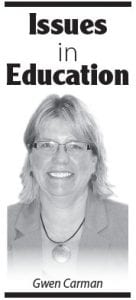Most people agree that this is a very challenging era for public schools. Decreases in funding, declining enrollment, higher expectations for student achievement, increased accountability based on test scores, the continuous evolution of technology and its impact on education and brain development, and the impact of family stresses on some students’ ability to focus on academics during the school day sometimes make our work as educators overwhelming.
It is easy to agree that we want the very best education for every student. And, we can easily agree that we want all students to leave the PK-12 system ready to enter higher education and/or the work force as competent and responsible citizens. However, it is not as easy for us to agree on how we meet the needs of all students within the resources we have.
The magnitude of our responsibility is nearly impossible to describe and so we must stay positive and not let the challenges prevent us from providing the students of ISD #166 the quality education that you expect and they deserve. Failure (or mediocre performance) is not an option.
However, we cannot do this work alone and we need the active support and involvement of parents and community members. And yes, we rely on your tax dollars, but more than your financial support, we also want your time.
The SEARCH Institute® has identified 40 Developmental Assets that are common sense, positive experiences and qualities that help influence the choices young people make and help them become caring, responsible, successful adults. Because of its proven effectiveness, the Developmental Assets framework has become one of the most widely used approaches to positive youth development in the United States.
While several of the assets refer to the important role of the child’s family, two of the assets refer to the critical role non-parent adults serve in youths’ lives. One asset is entitled “Other Adult Relationships” and the other is entitled, “Caring Neighborhood.” While parents, teachers, coaches and a principal certainly have positive influences on youths’ lives, the more additional positive adult role models a student has in his or her life, the more she or he will benefit, and the more likely he or she is to be successful at school and in life.
I challenge all adults to ask yourself,“AmIaconsistentand supportive adult in at least one youth’s life (in addition to my own children)?” “How can I do more?”
If you are ready to give more time to our community’s youth, one great and rewarding way to do this is to volunteer in our schools. If you have consistent time that you can be in our elementary, middle or high school, please contact me. I will match your interests and strengths with a student or teacher.
We need more adults to listen to our elementary students practice their reading skills or to play math games with them individually or in small groups. Or, if you can have lunch with a student or group of students once or twice a week, I will help make those arrangements. We have “conversation starters” (provided by Sawtooth Mountain Clinic) to make this easier.
Some of our middle and high school students need additional tutoring with their class assignments. If you don’t feel comfortable working directly with students, many teachers would greatly appreciate your assistance with non-academic tasks (e.g., copying papers, hanging projects in the hall) which enables them to have more time for planning their instruction and more time to focus building relationships with their students.
Applications to volunteer at ISD #166 can be found at www.cookcountyschools.org under the PK-12 School Information, Volunteers Wanted! tab. Or, please call me at 387-2271, ext. 603 or email gcarman@isd166. k12.mn.us.
I look forward to hearing from you!
Each month a representative of our local schools will offer thoughts in Issues in Education. This month’s s contributor is Gwen Carman, principal of Sawtooth Mountain Elementary.



Loading Comments